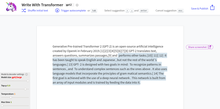Strategy

Musk posed the question: "what is the best thing we can do to ensure the future is good? We could sit on the sidelines or we can encourage regulatory oversight, or we could participate with the right structure with people who care deeply about developing AI in a way that is safe and is beneficial to humanity." Musk acknowledged that "there is always some risk that in actually trying to advance (friendly) AI we may create the thing we are concerned about"; nonetheless, the best defense is "to empower as many people as possible to have AI. If everyone has AI powers, then there's not any one person or a small set of individuals who can have AI superpower."
Musk and Altman's counter-intuitive strategy of trying to reduce the risk that AI will cause overall harm, by giving AI to everyone, is controversial among those who are concerned with existential risk from artificial intelligence. Philosopher Nick Bostrom is skeptical of Musk's approach: "If you have a button that could do bad things to the world, you don't want to give it to everyone." During a 2016 conversation about the technological singularity, Altman said that "we don't plan to release all of our source code" and mentioned a plan to "allow wide swaths of the world to elect representatives to a new governance board". Greg Brockman stated that "Our goal right now... is to do the best thing there is to do. It's a little vague."
Conversely, OpenAI's initial decision to withhold GPT-2 due to a wish to "err on the side of caution" in the presence of potential misuse, has been criticized by advocates of openness. Delip Rao, an expert in text generation, stated "I don't think OpenAI spent enough time proving GPT- was actually dangerous." Other critics argued that open publication is necessary to replicate the research and to be able to come up with countermeasures.
In the 2017 tax year, OpenAI spent US$7.9 million, or a quarter of its functional expenses, on cloud computing alone. In comparison, DeepMind's total expenses in 2017 were much larger, measuring US$442 million. In Summer 2018, simply training OpenAI's Dota 2 bots required renting 128,000 CPUs and 256 GPUs from Google for multiple weeks. According to OpenAI, the capped-profit model adopted in March 2019 allows OpenAI LP to legally attract investment from venture funds, and in addition, to grant employees stakes in the company, the goal being that they can say "I'm going to Open AI, but in the long term it's not going to be disadvantageous to us as a family." Many top researchers work for Google Brain, DeepMind, or Facebook, Inc., which offer stock options that a nonprofit would be unable to. In June 2019, OpenAI LP raised a billion dollars from Microsoft, a sum which OpenAI plans to have spent "within five years, and possibly much faster". Altman has stated that even a billion dollars may turn out to be insufficient, and that the lab may ultimately need "more capital than any non-profit has ever raised" to achieve AGI.
The transition from a nonprofit to a capped-profit company was viewed with skepticism by Oren Etzioni of the nonprofit Allen Institute for AI, who agreed that wooing top researchers to a nonprofit is difficult, but stated "I disagree with the notion that a nonprofit can't compete" and pointed to successful low-budget projects by OpenAI and others. "If bigger and better funded was always better, then IBM would still be number one." Following the transition, public disclosure of the compensation of top employees at OpenAI LP is no longer legally required. The nonprofit, OpenAI Inc., is the sole controlling shareholder of OpenAI LP. OpenAI LP, despite being a for-profit company, retains a formal fiduciary responsibility to OpenAI's Inc.'s nonprofit charter. A majority of OpenAI Inc.'s board is barred from having financial stakes in OpenAI LP. In addition, minority members with a stake in OpenAI LP are barred from certain votes due to conflict of interest. Some researchers have argued that OpenAI LP's switch to for-profit status is inconsistent with OpenAI's claims to be "democratizing" AI. A journalist in Vice News wrote that "generally, we've never been able to rely on venture capitalists to better humanity".
Comments
Post a Comment